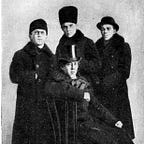Locally Sourced Epistemology
Knowledge can be tied to experience and said that what we perceive as our free will is actually the consequence of a phenomena that ends with our awareness. Giving our awareness little significance with regards to the more relevant events of the past.
We can, however, try to remove the relevance of the past by contextualizing experience as the result of co-temporal axioms rather than consider experience as the result of something that happened from before. Which gives more relevant to our awareness and its significance.
Western science is an example of this. Scientific predictions and expectations, what breathes life into theories and hypotheses, are measured in very limited context. If the context provides the sequence of events that prove the expectation, the context is validated as a possibly universalable context that will always result in the same/similar expectation.
What makes one context relevant in all other similar contexts is that science coincidentally basis its theories on the imperceptible events from the past. This makes our effort of contextualizing our experience as timeless impossible but the limits are imposed by the example used. Science is sober, sound and reasonable and thus limits its theories to “realistic” expectations.
An example that ties back to localized epistemology is imagine a scientist that is able time travel back to meet Aristotle. The scientist learns the language, takes care to not spread any diseases and prepares themselves to live in that kind of world. The scientist goes not knowing what to expect but having a strong foundations of scientific axioms that they can use as existential tools.
When meeting Aristotle, the scientist acts based on knowledge taken from the future applied to knowledge that preceded it. It’s easy to act like a God but the scientist is also in a position to show their work to an ancient mind that could possible understand the future’s knowledge.
If the scientist had fail to take any scientific instruments or materials with them, the scientist could still explain to Aristotle all the contemporary principles of science.
There would be a limiting context of the old world that will make the practicality of the new knowledge “look” different as it becomes “one” with the old knowledge. This becoming being seen in the actual consequence of the scientist and Aristotle melding their knowledge into something that can be used to motivate the actions of the old world citizens.
A totally unrelated example is language. Now science itself is an organic phenomena that has be formalized as “science.” The phenomena that drives science is the same that mentally drives the meaning within language.
Before science existed, people knew by trial and error how to do things right or how to improve their knowledge based on changing their expectations. The same way, the meaning of words change and we realize it the same way. Once we experience the word and its relations with the world is different, we recontextualize our understanding of the word so we can experience the word correctly defined.
Our understanding is then not a passive, trivial reference to right-ness. It’s an effort performed towards an expectation that we have no reason to be certain of but is locally validated and sound based on the reaction to our expectation. The expectation itself is based on the context (genetic makeup, societies’ technology, social class, mental health, upbringing) but there is a permanent disconnect that prevents the expectation from being within the context.
The context being all the consequences of the past but the expectations being based on axioms; axioms created by a re-contextualization of expectations by using our expectation to re-contextualize the context created by the events of the past. Our awareness, or the understanding of our awareness, or what we expect from our awareness, then becomes relevant by forming its own identity as an axiom that participates in propelling the context of our knowledge.
